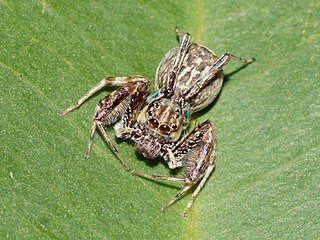
Myrmarachne is a genus of ant-mimicking jumping spiders that was first described by W. S. MacLeay in 1839. They are commonly called antmimicking spiders, but they are not the only spiders that have this attribute. The name is a combination of Ancient Greek μύρμηξ, meaning "ant", and ἀράχνη, meaning "spider".

Afromarengo is a genus of jumping spiders that was first described by S. P. Benjamin in 2004. The name is derived from "Africa" and the genus Marengo. The genus Indomarengo is similarly named.
Bianor is a genus of boreal jumping spiders that can grow to 3 and 4 mm. The robust shiny body and northerly distribution are distinctive. Males can be easily recognized by his swollen forelegs and females have orange legs. It was first described by George and Elizabeth Peckham in 1886, who names it after the mythical son of Hercules.

Brettus is a genus of jumping spiders. Its six described species are found in southern Asia from India to China and Sulawesi, with a single species endemic to Madagascar.

Carrhotus is a genus of jumping spiders that was first described by Tamerlan Thorell in 1891. The name is derived from the Greek Κάῤῥωτος.

Cocalus is a genus of jumping spiders that was first described by Carl Ludwig Koch in 1846, and is named after Cocalus, a Sicilian king of Greek mythology.
Colaxes is a genus of jumping spiders that was first described by Eugène Louis Simon in 1900.

Epeus is a genus of the spider family Salticidae. They are often found on broad-leaved plants or shrubs of rain forest, or in gardens of Southeast Asia.
Fluda is a genus of jumping spiders that was first described by George and Elizabeth Peckham in 1892.
Hindumanes is a genus of jumping spiders found in India. As of August 2020, two species have been described:
Indomarengo is a genus of the spider family Salticidae.

Onomastus is a genus of Asian jumping spiders that was first described by Eugène Louis Simon in 1900. It is the only genus in the subfamily Onomastinae.
Padilla is a genus of jumping spiders that was first described by George and Elizabeth Peckham in 1894. Most males have a characteristic long, forward projecting process on each chelicera that looks like a lance that is bent near the tip. The exception is P. javana, that doesn't have this feature.

Barychelidae, also known as brushed trapdoor spiders, is a spider family with about 300 species in 42 genera. Most spiders in this family build trapdoor burrows. For example, the 20 millimetres (0.79 in) long Sipalolasma builds its burrow in rotted wood, with a hinged trapdoor at each end. The 10 millimetres (0.39 in) long Idioctis builds its burrow approximately 5 centimetres (2.0 in) deep, just below the high tide level, sealing the opening with a thin trapdoor.
Scalidognathus is a genus of Asian armored trapdoor spiders that was first described by Ferdinand Anton Franz Karsch in 1892. Originally placed with the Ctenizidae, it was moved to the Idiopidae in 1985.
Sipalolasma is a genus of brushed trapdoor spiders first described by Eugène Simon in 1892. It is restricted to South Asia and parts of Africa.
Suffasia is a genus of ant spiders in the family Zodariidae, containing eight species restricted to India, Nepal, and Sri Lanka.
Marengo crassipes is a species of spider of the genus Marengo. It is native to India and Sri Lanka.

Chrysilla volupe is a species of spider of the family Salticidae. It is found in Sri Lanka, India, Nepal, and Bhutan.








